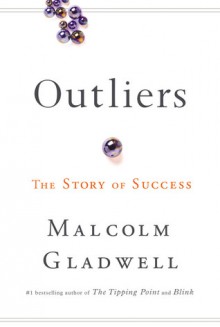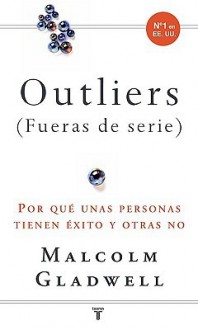
This is one of those books that give popular nonfiction a bad name. Which is unfortunate, because what could be better than books that both educate and entertain? But Outliers embodies everything that people who sneer at the genre are talking about: its conclusions are both obvious and simplistic, its writing persuasive but glib. It’s easy to see why Gladwell is a popular author: he’s a good storyteller, his writing accessible and entertaining. But this book is so riddled with oversimplified conclusions and strange contradictions that it should be read for entertainment, perhaps for gaining a little bit of knowledge on a few very specific subjects, but not to be taken too seriously.
Gladwell wants to examine why some people are wildly successful, and his basic thesis is pretty obvious: the most successful people benefit from advantages beyond their own talent. The first half of the book sticks mostly to this point, examining the advantages wildly successful people have had: much of it boils down to opportunities to hone their skills, though timing is also important. People who come of age in a favorable economy do better in their careers (no surprise there), while for skills where children are sorted into the gifted and the not at a young age, then given different levels of training, being born shortly after the cutoff date (and thus several months older than most of the competitors) confers a major advantage. The discussion of the effect of cutoff dates on hockey players (who are sorted at age 9 or 10) and on academics (with “gifted” classes often beginning in elementary school) is perhaps the best portion of the book, though Gladwell neglects to consider the psychological impacts of being classified gifted or not at a young age; it seems to me that even if kids aren’t separated out young, knowing you’re ahead of or behind your peers would affect your confidence.
The book takes an abrupt turn in the second half, to talk about cultural legacies: for instance, feuds used to be common in Appalachia due to an “honor culture,” while planes piloted by people from cultures with a high level of deference for authority used to crash more often, until people finally figured this out and started training flight crews to speak up when they saw danger. Interesting stuff, but only sort of related to the first half. Gladwell talks a lot about his theory that Asians are better at math because their ancestors farmed rice paddies, which is really hard work, and gave birth to a culture that values hard work. There may be something to this, but I suspect it’s a lot more complicated than that; check out Little Soldiers for an in-depth comparison between the Chinese and American school systems. The most startling thing about all this, though, is that Gladwell never asks why, if Asian cultures are so much better at hard work, and hard work is what leads to great success, why are all of his “outliers” Americans or Brits and not Chinese or Japanese? Why wasn’t the Internet invented in China, if Chinese rice-paddy culture is so perfect for math skills?
And the book is this way throughout, its analysis incomplete (and its outliers all white men). Gladwell coins the idea of the “10,000-hour rule” here – the notion that to become great at something, you have to practice for this magical number of hours. (He actually refers to this number as “magic” multiple times, despite the fact that the authors of the key study he relied on disagree with his analysis, pointing out that 10,000 hours was the average amount of practice put in by the best students at an elite music school, not a magic threshold between average and world-class. Gladwell, not the scientists, coined the idea of a 10,000-hour rule.) He talks at length about a study of violinists showing an apparently direct, linear correlation between hours practiced and skill, but that’s only one very specific talent (and those best violin students were merely expected to succeed, not yet embarked on their careers). Anyone who’s ever attended school knows that some people are just better at certain skills than others of similar backgrounds, even if nobody practices beyond their homework. And even Gladwell doesn’t quite seem to take his idea, that the number of hours practiced is all that matters, seriously. Within the same chapter he says, of the Beatles, “Lennon and McCartney had a musical gift of the sort that comes along once in a generation.” Wait, what? I thought this was a chapter about how it’s all about hours of practice, in a book that’s all about how the world is full of people whose talents are never realized because they didn’t get that lucky break. Huh.
There’s plenty of other intellectual shortcuts too. Gladwell says a couple of times that hockey players born in the latter half of the year “might as well not show up for tryouts at all” when they make up 30% of the teams – too low, obviously, but this hardly spells doom for the most talented. He conflates families who teach their kids how to work with the system and navigate institutions (as opposed to poorer families, which tend to impart the idea that the world happens to you and authority is always an antagonist) with families who hyper-schedule their kids, and then suggests that a hyper-scheduled childhood leads to success, despite the fact that this is a very recent phenomenon and generations of successful people have managed to do without it. (Current research even suggests that unstructured time is crucial for developing creativity and independence.) It’s clear why he makes this mistake, since hyper-scheduling is so common in today's middle- and upper-class families that, at least in the study he examines, it occurred in all the families who taught their kids effective self-advocacy. But these are two totally different parenting choices. He even refers a couple of times to the importance of having books in the home for children to read “if they’re bored,” a sad assumption from an author – that reading is a last-resort activity (of course, the schools and families he praises leave no time for it anyway).
I could go on, but plenty of others have reviewed this book already. Yes, the book has some interesting ideas and yes, it’s easy to read, but Gladwell is an intellectual lightweight. I wouldn’t recommend this one . . . unless, of course, you’re bored.

 Log in with Facebook
Log in with Facebook 








